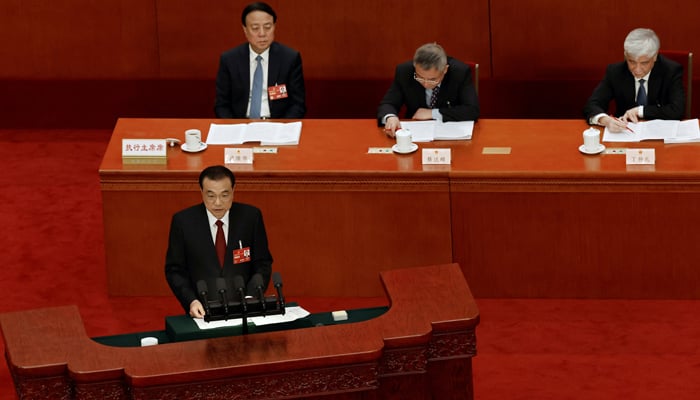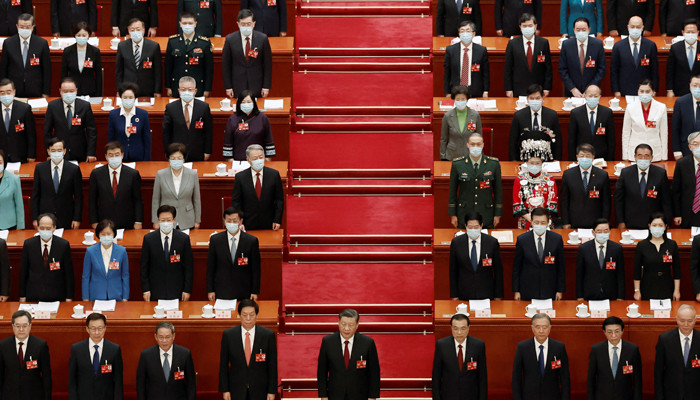BEIJING: China set a modest target for economic growth this year of around 5% on Sunday as it kicked off the annual session of its National People’s Congress (NPC), which is poised to implement the biggest government shake-up in a decade.
The economy gave one of its weakest performances in decades last year, when the gross domestic product (GDP) grew by just 3%, squeezed by three years of COVID controls, a crisis in the vast property sector and a crackdown on private enterprise.
In his work report, outgoing Premier Li Keqiang stressed the need for economic stability and expanding consumption, setting a goal to create around 12 million urban jobs this year, up from last year’s target of at least 11 million, and warned that risks remain in the real estate sector.

Li set a budget deficit target at 3.0% of GDP, widening from a goal of around 2.8% last year.
“Global inflation remains high, global economic and trade growth is losing steam, and external attempts to suppress and contain China are escalating,” Li said during his speech to open the parliament, which will run through March 13.
“At home, the foundation for stable growth needs to be consolidated, insufficient demand remains a pronounced problem, and the expectations of private investors and businesses are unstable,” he said.
This year’s growth target is at the low end of expectations, as policy sources had recently told Reuters a range as high as 6% could be set. It is also below last year’s target of around 5.5%.
Alfredo Montufar-Helu, Beijing-based head of the China Center at the Conference Board, said setting a higher growth target would have required massive stimulus and “exacerbated the structural imbalances that China is trying to deal with to achieve its long-term development goals.”
The lower target is more achievable, he said, and “recognises that the Chinese economy will be dealing with significant economic headwinds this year”.
China’s state planner said it aims to increase the incomes of low earners and bring more people into the middle-income group. The planner unveiled measures to spur consumption but stopped short of direct spending, such as cash handouts.
To bolster growth, the government plans to stick with its playbook of spending on infrastructure, increasing funding for big-ticket projects with 3.8 trillion yuan ($550 billion) in special local government bonds, up from last year’s 3.65 trillion yuan.
The 67-year-old Li and a slate of more reform-oriented policy officials are set to retire during the congress, making way for loyalists to President Xi Jinping, who further tightened his grip on power when he secured a precedent-breaking third leadership term at October’s Communist Party Congress.
During the NPC, former Shanghai party chief Li Qiang, 63, a longtime Xi ally, is expected to be confirmed as premier, tasked with reinvigorating the world’s second-largest economy.
The parliament will also discuss Xi’s plans for an “intensive” and “wide-ranging” reorganisation of state and Communist Party entities, state media reported on Tuesday, with analysts expecting a further deepening of Communist Party penetration of state bodies.
Military budget rise
Li said China’s armed forces should devote greater energy to training under combat conditions and boost combat preparedness, and the budget included a 7.2% increase in defence spending this year, a slightly bigger increase than last year’s budgeted 7.1% rise and again exceeding expected GDP growth.
On Taiwan, Li struck a moderate tone, saying China should promote the peaceful development of cross-Strait relations and advance the process of China’s “peaceful reunification”, but also take resolute steps to oppose Taiwan’s independence.
Beijing faces multiple challenges including increasingly fraught relations with the United States, which is trying to block its access to cutting-edge technology, and a worsening demographic outlook, with plunging birth rates and a population drop last year for the first time since the famine year of 1961.
China plans to lower the costs of childbirth, childcare and education and will actively respond to an ageing population and a decrease in fertility, the nation’s state planner said in a work report released on Sunday.
The NPC opened on a smoggy day amid tight security in the Chinese capital, with 2,948 delegates gathered in the cavernous Great Hall of the People on the west side of Tiananmen Square.
During the session, China’s legislature will vote on a plan to reform institutions under the State Council or cabinet, and decide on a new cabinet line-up for the next five years, according to a meeting agenda.
It is the first NPC meeting since China abruptly dropped its zero-COVID policy in December, following rare nationwide protests. Excluding the pandemic-shortened meetings of the previous three years, this year’s session will be the shortest in at least 40 years, according to NPC Observer, a blog.

